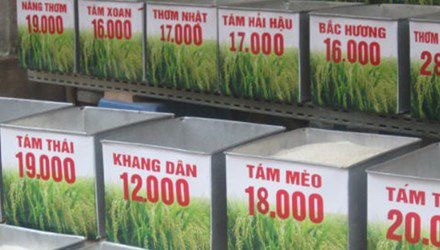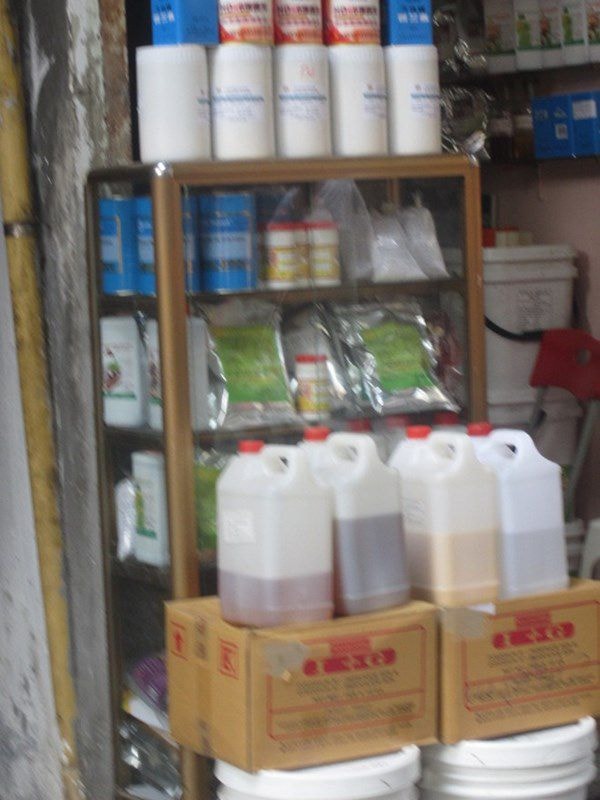Using chemicals to transform ordinary rice into premium rice
To "magically" turn ordinary rice into premium rice to increase the price, some wholesalers do not hesitate to mix in flavorings.
Any flavor is available
Faced with the news that rice traders use flavorings to create a scent and prolong the shelf life of rice, reporters took on the role of learning about flavorings and plasticizers that create a scent for rice.
In the role of a rice buyer for retail, we went to some rice wholesale stores to find out. As soon as we entered the store of Ms. Le Thi L. (in Quan Nhan, Thanh Xuan, Hanoi), we were greeted like regular customers: "Do you want rice? How much? The rice I sell is of the standard type, guaranteed to be fragrant from the time it is still a grain of rice until it is cooked into rice."
 |
Illustration
After a while of talking, when we expressed to the wholesaler about our need to import rice to open a retail agency, and needed some tricks to make a little profit, the owner was cautious. But then she showed us some tricks that traders often use to make rice fragrant.
“I only sell standard rice, guaranteed quality, the aroma of the rice is not lost after cooking. However, I have heard about some flavorings such as sticky rice flavor, green rice flavor, jasmine flavor being used to create the aroma of rice.
You can mix it in any proportion you like, until the rice has a subtle scent. But in my experience (!), just adding a drop of flavoring to a basket of rice is enough to create a lot of scent,” the owner said.
At a small rice shop on Kim Giang Street, we received a similar answer. Ms. Ngan, a rice trader on Kim Giang Street, said that the better the flavoring, the less expensive the ratio of the flavoring to the rice, and the longer the scent lasts.
"Pineapple, green rice, and jasmine flavors are the easiest to mix. The mixing ratio is usually 1 liter of flavoring can mix with more than a ton of rice." As for where to buy flavoring, according to Ms. Ngan's instructions, it is at Cau Dien market or the old quarter area.
Talking about the risk of toxicity to consumers when exposed to this floating flavoring, the restaurant owner calmly said: "Although my family does not eat this rice, no one has gotten sick from smelling it for many years. Using less means less possibility of toxicity," said the rice wholesaler.
 |
Flavoring agents, plasticizers, and rice preservatives of unknown origin are rampant.
Rice preservative chemicals are rampant.
To learn about rice flavorings, we visited several places such as Hom market, Hang Buom street, Phung Khoang market, Cau Dien market...
On Hang Buom Street, which is said to be the main source of floating chemicals, we asked the owner of a flavoring shop about the chemicals that make rice fragrant and expand. They showed us bottles of sticky rice, jasmine, or pineapple flavoring, priced at 40,000 VND for a 100 ml bottle. With this bottle, the buyer can mix it with a whole nest of rice.
Continuing to learn, we went to the next store, the owner also offered some colorless flavors, used to create characteristic scents such as rice scent, green rice scent, priced at 400,000 VND/kg, imported from Thailand.
According to the shop owner, although these spices are expensive, just a few drops are enough to make a whole basket of rice fragrant. As for the spices in cans, the shop sells them by the can, without labels, each can costs 400,000 VND. After mixing, the rice is guaranteed to be fragrant, such as sticky rice or fragrant rice, and then the seller can freely sell it at an exorbitant price.
According to long-time rice traders, it is very difficult to distinguish between flavored and unflavored rice. Because the process of mixing rice with flavoring is quite elaborate. Rice is usually mixed in a "quite standard" ratio (!). And usually the rice grains are only fragrant when not cooked, when cooked, the smell will be lost, and the rice grains will be broken.
Rice marinated with flavorings for a long time can lead to a high risk of poisoning.
According to Associate Professor Dr. Nguyen Duy Thinh, Institute of Biotechnology and Food Technology, to make rice fragrant and preserve it longer, sellers often use flavoring agents. There are many different flavoring agents, originating from China and Thailand. Long-term exposure to flavoring agents can lead to the risk of cancer and respiratory diseases. Rice that has been flavored for a long time can lead to a high risk of poisoning... According to Mr. Thinh's advice, when buying rice, consumers should choose white, long, and unbroken rice grains, not deformed or strangely colored rice grains. Consumers should put a handful of rice in their hands to smell it. If the aroma lasts a long time or is too fragrant, they should not buy it, because it is likely that this is rice flavored with flavoring agents.
According to Hanoi Moi






